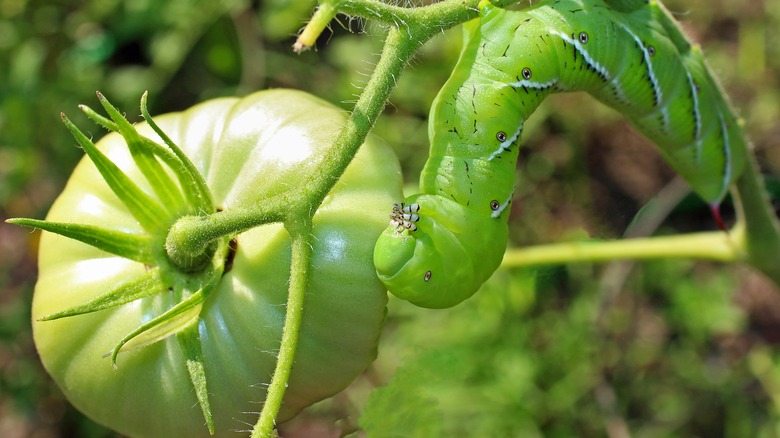Shine A Blacklight On Your Tomato Plants To Find Sneaky Pests
Having a garden chock full of homegrown tomatoes can be a deliciously rewarding experience. Not only are these plants reasonably easy to maintain in a backyard garden, but they are also scrumptious and can come in many different varieties suited for snacking, making sauces, or enhancing salads. However, just like with any vegetable plant, there are plenty of pests out there ready to nibble away at the stems and leaves and ruin all of your work. Insects like tomato hornworms can wreak havoc on your plants and lay waste to what could be a perfect harvest. Luckily, in the case of tomato hornworms, there is a clever way to get rid of these pests so that they don't cause permanent damage to your precious tomato plants.
Because of their pale green appearance, these caterpillars can easily hide under the leaves or stems of your plants. But with the help of a blacklight, you can easily expose these critters and pick them right out of your garden. Mainly munching at night, the tomato hornworm will work its way at the leaves of healthy tomato plants and even nosh on the fruit itself. To get rid of these pests, all you have to do is wait until nightfall, bring out a blacklight, and shine it in and around your tomato plants. Tomato hornworms will actually give off a fluorescent green and white glow, which will make them easy to spot and pull off of your plants.
How to get rid of tomato hornworms once spotted
When stalking the tomato-hungry hornworm with the help of your trusty blacklight, you might be wondering what to do with the little critters once their fluorescence gives away their hidden location. The moment you find a tomato hornworm in your garden, you can easily pick them off of the plant and place them in a jar or bowl. If the idea of grabbing squiggly worms with your bare hands isn't in your wheelhouse, then a small pair of tongs or even chopsticks are just the thing to pick them up.
When you have rounded up all of the hornworms, you can either reposition them to your nearest wooded area, dispose of them in soapy water, or, in certain circumstances, you can save them for another purpose. If you find a tomato hornworm with tiny rice-like white growths along the side of its body, you may want to keep it around. The white growths could be the parasitic larvae of the braconid wasp. The larvae feed off of the hornworm, and then the adults become natural predators of the worm. These types of wasps look more like ants and don't have the capability to sting humans, but they can be very beneficial for ridding your garden of leaf munchers like the tomato hornworm. To deter hornworms from being attracted to your tomatoes, you could grow companion plants such as dill, mustard, or parsley to help ward them off.
